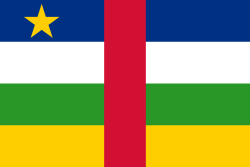Contents
- Christianity (89.0%)
- Islam (9.00%)
- Traditional faiths (1.00%)
- Others / None (1.00%)
| Part of a series on the |
| Culture of the Central African Republic |
|---|
 |
| People |
| Languages |
| Cuisine |
| Religion |
| Music |
| Sport |

Christianity is the predominant religion in Central African Republic , with significant minorities of the adherents of Islam and Traditional African religions.
The country is officially secular and freedom of religion is enshrined in its constitution. Christmas and Easter are recognised as public holidays. [2]